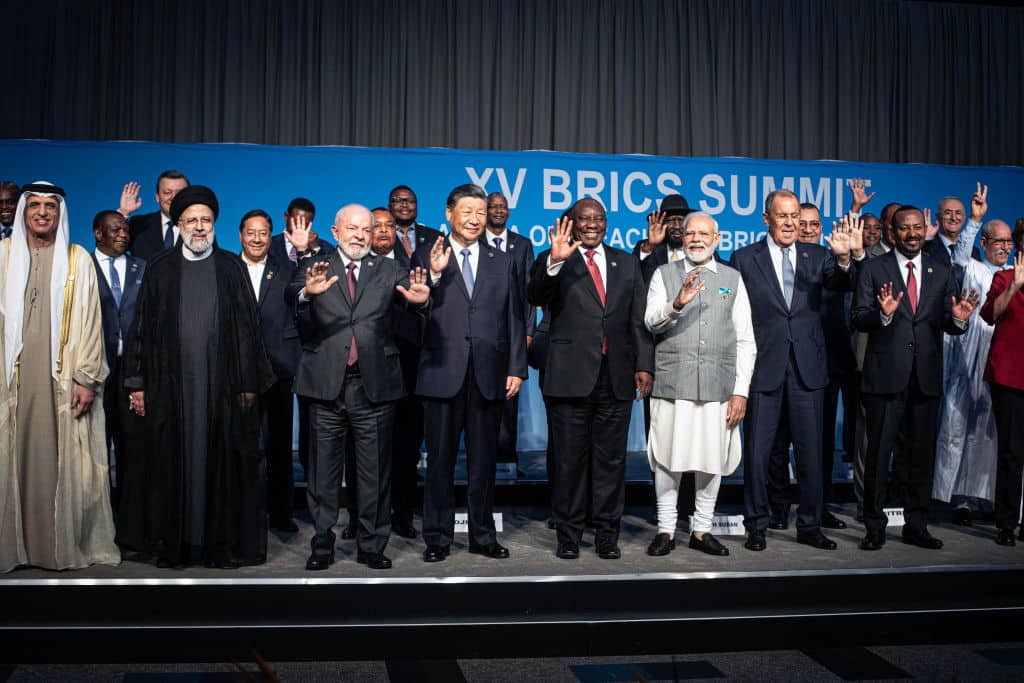At day three of the 15th BRICS Summit, the bloc’s expansion, welcoming Argentina, Egypt, Ethiopia, Iran, Saudi Arabia, and the UAE, heralds a new phase of global collaboration and influence.
In a significant move that has captured global attention, the BRICS bloc is set to welcome new members for the first time since the adoption of South Africa in 2010, ushering in a chapter of expanded collaboration and shared markets. Argentina, Egypt, Ethiopia, Iran, Saudi Arabia, and the United Arab Emirates (UAE) are poised to become full members of the BRICS family, amplifying the possible leverage the bloc is able to implement globally, as well as increasing the entity’s capability as a counterbalance to the West.
“The world is changing,” commented South African President Cyril Ramaphosa in his closing remarks at the three-day BRICS Summit in Johannesburg. “New economic, political, social, and technological realities call for greater cooperation between nations. These realities call for a fundamental reform of the institutions of global governance, so that they may be more representative and better able to respond to the challenges that confront humanity.”
The expansion announcement was made by Ramaphosa, who chaired the summit. It represents a carefully deliberated and agreed-upon step signifying consensus among the existing BRICS members – Brazil, Russia, India, China, and South Africa – to broaden the bloc’s scope and deepen its collaborative efforts.
The BRICS grouping, which collectively represents a significant portion of the global economy, trade, and population, has garnered attention not only for its economic significance but also for its potential to shape international discourse and policy. The inclusion of Argentina, Egypt, Ethiopia, Iran, Saudi Arabia, and the UAE extends this influence to regions that bring unique perspectives, resources, and challenges.
Loading...
The invitations to join the bloc are particularly significant given the close relationship between Saudi Arabia, the UAE, and the West, for which BRICS has increasingly come to counterbalance. The expansion indicates a clear view for a multipolar world order characterized by equitable development, sustainable growth, and collective security. It is a testament to the bloc’s commitment to fostering cooperation in areas such as trade, investment, technology exchange, and cultural understanding. By embracing these new members, BRICS solidifies its role as a platform for dialogue and collaboration, even as the global geopolitical landscape continues to evolve.
This multipolar support was no clearer than in the addresses of China’s President Xi Jinping, noting the event’s historic significance; “The expansion is also a new starting point for BRICS cooperation. It will bring new vigor to the BRICS cooperation mechanism and further strengthen the force for world peace and development.”
President Vladimir Putin too gave a closing address via video call.
Prime Minister Narendra Modi of India, a key player in the BRICS partnership, emphasized the expansion’s significance in his address; “India has always supported the expansion of BRICS. India has always believed that adding new members will strengthen BRICS as an organization.” Modi highlighted that the inclusion of these nations is a symbol of openness, inclusivity, and cooperation that extends beyond national boundaries. This sentiment resonates with the BRICS ethos of mutual respect and the pursuit of common goals for the betterment of all member nations.
The BRICS expansion holds the potential to foster economic growth, innovation, and the sharing of best practices among member nations. It is anticipated to enhance trade ties and investment opportunities. This enlargement positions the BRICS bloc as a resilient and collaborative force, capable of influencing economic outcomes and promoting stability.
Beyond the economic realm, the expansion offers an avenue for constructive dialogue on pressing global issues. By incorporating nations from different regions, the BRICS bloc can diversify its perspectives and responses to challenges such as climate change, cybersecurity, and geopolitical tensions. The inclusion of nations like Iran, Saudi Arabia, and the UAE brings a heightened focus on Middle East dynamics, allowing for enhanced dialogue and understanding.
Of note regarding the attempts at the bloc’s expansion are the inclusion of offerings of membership of the UAE and Saudi Arabia, which have long-established relationships with the West, with which the Russian Federation and China find themselves opposed with the war in Ukraine and trade conflicts, respectively.
As the world watches this expansion unfold, it’s worth noting that BRICS is not merely an economic or political grouping but a lever of global diplomatic influence.
Loading...
